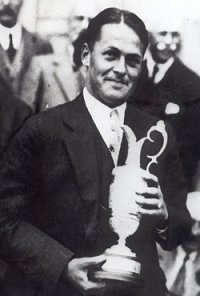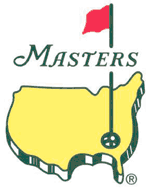 Bobby Jones is one of the truly legendary figures of golf. Among other things, he helped found Augusta National and the Masters, but he will always be best known for the Grand Slam of 1930.
Bobby Jones is one of the truly legendary figures of golf. Among other things, he helped found Augusta National and the Masters, but he will always be best known for the Grand Slam of 1930.
Jones was successful on and off the course, but it was his play that has made him immortal. There are really just three names that come up in a discussion of the greatest golfer of all time: Jack Nicklaus, Tiger Woods, and Bobby Jones. While Jones may be trailing in comparisons these days, it’s difficult to dismiss all he did in a short (and amateur) career.
“Down the years people have wondered whether Jones was the greatest of all golfers,” British golf writer Pat Ward–Thomas said of Jones. “Comparison is invidious, for no man can do more than win and Jones won more often within a given period than anyone else has ever done. In his time, Jones was supreme, at match and medal play, to a greater extent than Hogan or Nicklaus have been in theirs.”
Assuming that he continues the way he’s been going, by the time Tiger Woods is 40 he will likely be accepted by (nearly) all as the greatest of all time. But he will still have a ways to go to catch up with the impact that Jones has had on the game.
When Jones died on December 18, 1971, golfers on the Old Course at St. Andrews suspended their rounds as the flag on the clubhouse in front of the 18th hole was lowered to half staff.
Here are a few more facts about the life and golfing prowess of Bobby Jones.
Hole One: A Shaky Start
Born on St. Patrick’s Day, 1902, in Atlanta, Georgia, Robert (Bobby) Tyre Jones, Jr. – the only son of Colonel Robert P. Jones, a prominent Atlanta lawyer, and his wife Clara – was a sickly child unable to eat solid food until he was five. When he was six, his family moved to a summer home near East Lake Country Club where Bobby grew healthier and began playing baseball and golf.
Hole Two: First Swings
With his father’s encouragement, Jones tried competitive golf, and success came immediately. As a six-year-old, he beat three other children in his first tournament at East Lake. Jones won the Atlanta Athletic Club junior title as a nine-year-old, over a 16-year-old opponent.
Hole Three: Phenom
Jones’ winning ways continued into his teens. At 14, he won the East Lake Invitational and the Georgia Amateur, defeating his good friend Perry Adair in the 36-hole final. George Adair, Perry’s father and a prominent Atlanta realtor, had already planned to take his son to the 1916 U.S. Amateur at the Merion Cricket Club in Ardmore, Pennsylvania. With the family’s permission, he also took Bobby along, allowing him to beocome the youngest player ever to qualify for and play in a U.S. Amateur Championship. Though he didn’t win, Jones impressed fans and fellow competitors by leading the championship at one point and by beating 1906 U.S. Amateur champion Eben Byers and Pennsylvania Amateur champion champion Frank Dyer before losing in the third round to defending champion Bob Gardner.
Hole Four: Hot Head and Good Advice
 Early on, Jones struggled with a volcanic temper. From 1916 until 1923 Jones failed to win a major championship, going 0-10. After a disastrous first visit to St. Andrews for the 1921 British Open Championship and en route to the U.S. Open, Jones asked O.B. Keeler, a friend and Atlanta newspaperman who would follow Jones for his entire career, “I wonder if I’ll ever win a championship?” Keeler is said to have responded, “Bobby, if you ever get it through your head that whenever you step out on the first tee of any competition, you are the best golfer in it, then you’ll win this championship and a lot of others.”
Early on, Jones struggled with a volcanic temper. From 1916 until 1923 Jones failed to win a major championship, going 0-10. After a disastrous first visit to St. Andrews for the 1921 British Open Championship and en route to the U.S. Open, Jones asked O.B. Keeler, a friend and Atlanta newspaperman who would follow Jones for his entire career, “I wonder if I’ll ever win a championship?” Keeler is said to have responded, “Bobby, if you ever get it through your head that whenever you step out on the first tee of any competition, you are the best golfer in it, then you’ll win this championship and a lot of others.”
Hole Five: Student Athlete
Jones was a model student. He earned a Mechanical Engineering degree at Georgia Tech, and then went on to earn a second BS degree, this time in English Literature, from Harvard. Later, he entered Emory University to earn a law degree and passed the bar exam after just his first year of school.
Hole Six: Jones Gets Hot
From 1923 through 1930, Jones won 13 of 21 major championships he entered. He won five U.S. Amateurs, one British Amateur, four U.S. Opens and three British Open Championships. In 1926, he became the first to win the Open Championship of both the United States and Britain in the same year.
Hole Seven: The Grand Slam
1930 was the year of Jones. He won the British Amateur on the Old Course at St. Andrews, the Open Championship at Royal Liverpool, the U.S. Open at Interlachen Country Club, and the U.S. Amateur at Merion to win the Grand Slam.
Following his ultimate triumph, Jones retired from competitive golf at the age of 28 (except for playing in the early editions of the Masters). Of the final 12 Opens that Bobby Jones played (nine U.S. and three British), he won or finished second in 11 of them.
Hole Eight: Life After Golf
Jones married Mary Rice Malone in 1924. The couple had three children: Clara, Robert Tyre III, and Mary Ellen.
 In the years following his “retirement” from golf, he designed golf clubs, wrote four books, and gave instructional performances for Warner Brothers’ How I Play Golf movie serial. Jones was named President of Augusta National in 1933 and remains President in Perpetuity.
In the years following his “retirement” from golf, he designed golf clubs, wrote four books, and gave instructional performances for Warner Brothers’ How I Play Golf movie serial. Jones was named President of Augusta National in 1933 and remains President in Perpetuity.
Along with his friend Clifford Roberts, Jones helped establish Augusta National and the Masters. Originally, they had hoped to attract a U.S. Open to the course, but, because the USGA always held the Open in June or July when Georgia is very hot and humid, the likelihood of getting the Open was remote to say the least. So Roberts and Jones decided to start their own invitational tournament. It’s turned out pretty well.
Hole Nine: A Gentleman and a Sportsman
Aside from his stellar play on the course, Jones was also known as a gentleman and the embodyment of sportsmanship and fair play. During the final round of the 1925 U.S. Open at the Worcester Country Club, Jones ball ended up in the rough just off the fairway, and as he prepared to play his shot, the ball moved slightly. Jones turned to the marshals and called a penalty on himself. The marshals asked some in the gallery if anyone had seen the ball move. No one had. Except for Jones. He called the two-stroke penalty on himself and wound up losing the tournament by a stroke. When he was praised for his gesture, Jones replied, “You may as well praise a man for not robbing a bank.”
For More Information
Bobby Jones, Wikipedia
Photo Credits: © St. Andrews .org

The movie “Bobby Jones: Stroke of Genius” is one of my favorite sports movies. He led an awesome life and was a man of great principle. I have been very impressed with the writing ability of this website’s staff. Well done, once again.
As the argument goes, the fact that Bobby did what he did as an amateur, while still holding a full-time job as a practicing lawyer, is what really adds weight to his moniker as greatest golfer of all time. Had he turned pro and dedicated his life full-time to golf, there’s no telling what records Tiger might be trying to break.
Bobby gets my vote.
Nice piece in preparation for the Masters!! The azaleas are ready and waiting.
Great informative read on Bobby Jones!
All true on Bobby, but you exclude Hogan from the level of Tiger, Jack and Bobby?
Good point Scott. I very nearly made that “only four names that come up” and included Hogan, but then I started arguing with myself about it. Perhaps that line should read “the names that usually come up these days.” Hogan doesn’t seem to get as much acclaim as he once did. But it is a tough call just where to put that cut line.
There is a very interesting story about the Bobby Jones Grand Slam that I read in a book. No one really thought that the Grand Slam was possible except for Bobby Cruickshank a golfer from Scotland who early in the year bet $500 that Jones would win all the four majors. He got 120-1 odds on that. By the end of the year he was richer by $ 60,000. Of course it was a real pity that Bobby Jones decided to retire from competitive golf at the age of 28.
His tryst with the British Open was an interesting one. He withdrew halfway through his first appearance at St Andrews in 1921, expressed his dislike for the Old course and thus incurred the wrath of the locals. He didn’t even bother to play in the Open championship the next few years. He only played the Open three times after that and won it on all three occasions.
A degree in Mechanical Engineering from Georgia Tech and one in English Literature from Harvard meant he was a very accomplished man. The greatest tragedy of it all was the fact that Golf was just a part time activity for him, something to which he only devoted a few months in a year.
When speaking about amateur golfers of the era, a name often overlooked hailed from my area, Johnny Goodman. (last amateur to win the US Open). There is a book called king of Swing I believe which chronicles his career including an upset win over Bobby Jones. The best part of the book is the feel it gives you for how golf, and access to golf was different in that era.
As an Atlantan and a Georgia Tech alum, Bobby Jones is my favorite all-time golfer. Having just returned from a magical day on his creation two hours east doesn’t hurt…. 😀
For me the four all-time greats include your three, and Harry Vardon. An absolutely dominant player who so revolutionized the game that we’re still using his grip 120 years later.